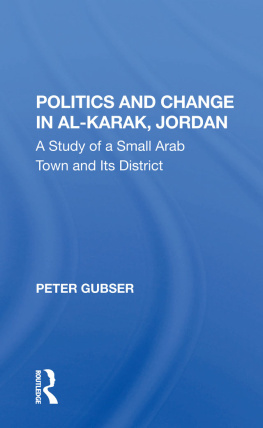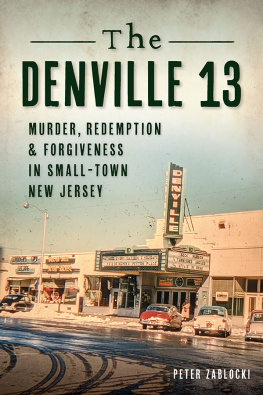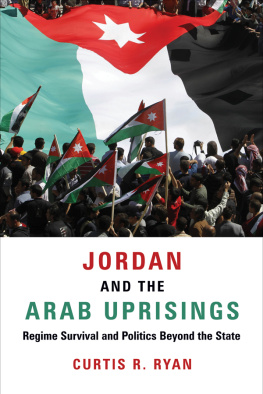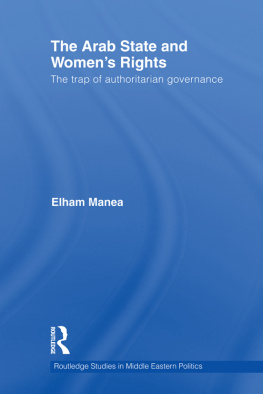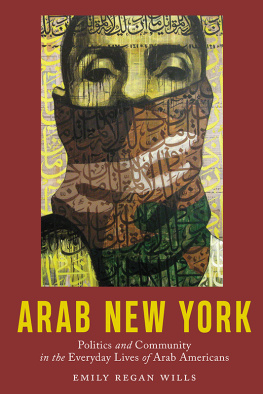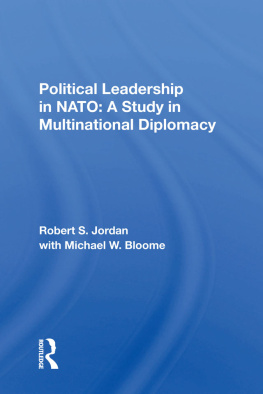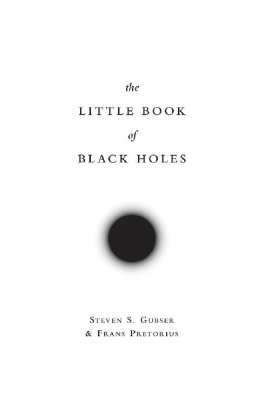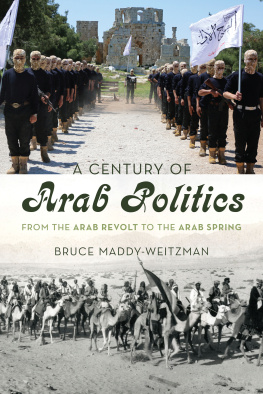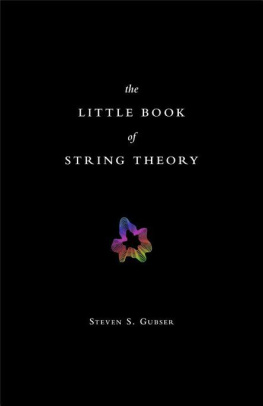First published 1985 by Westview Press, Inc.
Published 2019 by Routledge
52 Vanderbilt Avenue, New York, NY 10017
2 Park Square, Milton Park, Abingdon, Oxon OX14 4RN
Routledge is an imprint of the Taylor & Francis Group, an informa business
Copyright 1985 by Peter Gubser
All rights reserved. No part of this book may be reprinted or reproduced or utilised in any form or by any electronic, mechanical, or other means, now known or hereafter invented, including photocopying and recording, or in any information storage or retrieval system, without permission in writing from the publishers.
Notice: Product or corporate names may be trademarks or registered trademarks, and are used only for identification and explanation without intent to infringe.
Library of Congress Catalog Card Number: 85-51310
ISBN 13: 978-0-367-28359-9 (hbk)
When Politics and Change in Al-Karak, Jordan first appeared, it was part of a sparse, but growing, literature about intermediate-level politics in the Arab Middle East. A number of works had been written on national politics, focused primarily on the capital and national institutions and figures. A few village studies, which used the discipline of political anthropology, also existed. Politics and Change was an attempt to look below the national level of politics, but in a context larger than the confines of a village or a single tribe.
One of the general purposes of the study was to probe and then describe and analyze how a districta natural grouping of villages and its provincial capitalis structured in a sociopolitical sense and then examine the political dynamics within this system. Recognizing that a district does not exist in isolation, a second general purpose was to investigate the district's relations with neighboring districts and with the state, primarily with the national capital. These structures and dynamics still pertain today, although they have changed to some degree during the seventeen years since the field study was undertaken.
When I first went to Al-Karak, the intent was to study just the town. The extant, but limited, literature on other Arab towns suggested that it would be a natural subject of inquiry. In a sense, the village studies undertaken by anthropologists also indicated indirectly the appropriateness of that arena of study. However, I soon discovered that the town was highly integrated with the district's villages, so the scope of the study was expanded accordingly. Not only was there integration with respect to commerce, trade, and government services, but the tribes of the town were also the tribes of the villages. Their members frequently intermarried and continually visited one another: Essentially they were part of the same close social system. One example of the countryside's continuing power in the town is that very few families of the Majaly tribe reside in the town, but the Majaly have long dominated the politics of both town and district. For instance, a Majaly was mayor of Al-Karak from the establishment of the municipality under the Ottomans until 1976, and the shaykh of the shaykhs (leader of the leaders) has been a Majaly for centuries.
Al-Karak was chosen as the subject of study, not for any intrinsic quality of the delightful little town, but as an example of an Arab town and its district in the Fertile Crescent. Al-Karak represents a fascinating case study from both historical and contemporary perspectives. After reviewing the literature and conducting preliminary talks with people in the town, I decided that it would be appropriate to look at AlKarak over a hundred-year period, from the 1870s to the late 1960s. Using this expanse of time, felt that I could adequately probe Al-Karak's changing relationship to central authority.
The stages Al-Karak has passed through since the 1870s represent a microcosm of Transjordan's (later Jordan's) history. During the first stage, the 1870s and 1880s, Al-Karak, although a part of the Ottoman Empire, was virtually independent. Ottoman officials in Damascus and Constantinople did not exercise authority in the district. The second stage began in 1893, when the Ottoman army marched into the district and installed a governor, a garrison, and, eventually, a local municipality in the town of Al-Karak.
The third stage was the tumult of World War I and its aftermath. Unlike the bedouin who cooperated with Sherif Hussein's Arab Revolt against the Ottomans, the people of Al-Karak, largely a settled or semisettled people, contributed irregulars composed of troops of horsemen to the Ottoman side of the battles. Following the defeat of the Ottomans, Al-Karak's situation was decidedly unsettled. The town sent delegates to King Faisal's Damascus-based government before he was routed by the French in 1920. The tribes of Al-Karak also established briefly the little-known Arab government of Moab (Moab being the ancient name of Al-Karak), which disappeared upon the arrival in Transjordan of Amir Abdullah (son of Sherif Hussein and brother of the defeated King Faisal).
The fourth phase began with Amir Abdullah's creation of the Amirate (Princedom) of Transjordan in the 1920-1921 period. Al-Karak quickly became a loyal part of the amirate, although the newly founded Arab Legion (led by a British colonel, Frederick Peake) had to put down intradistrict armed strife. Such action helped prove the worth of the military and the efficacy of Amman, the capital of Transjordan. The action was also instrumental in creating the web of connections between the district and the capital. One important connection was made when Amir Abdullah took a son of one of the most powerful Karaki shaykhs as his protg. The young man eventually became commander of the Jordan Arab Army. During the final phase, Al-Karak grew and modernized along with the rest of the country, and its citizens and leaders became involved in many national institutions.
Since 1968, when material for this book was gathered, Al-Karak has continued to evolve. In 1984, I published a partial update in Cantori and Harik's book, Local Politics and Development in the Middle East. the normal relations between Karaki tribes and their leaders. Presumably, the reason for lack of success was that the municipal institution formalized and hardened relationships that had been more fluid, and it gave command over material resources not previously available to district leaders. As the book indicates, the municipality tended to be dominated by one man and his group to the exclusion of others, or it became deadlocked and did not function properly or at all: That is, the municipality would not deliver vital services.
This pattern changed during the 1970s and 1980s. Two rounds of municipal elections have been held in Jordan since 1976. In Al-Karak, as in other towns, young technocrats, some of whom were previously members of outlawed political parties, took control of the municipality. Under the new more educated generation, it is reported that the institution operates relatively smoothly and is properly providing needed services.


